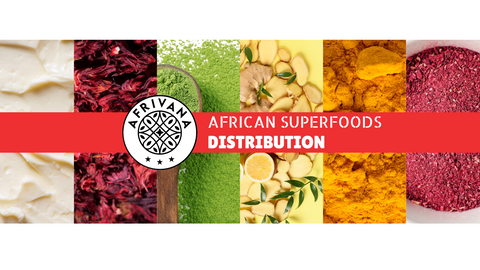African Superfoods
African Superfoods


In the Caribbean, they call it Sorrel.
Sorrel, also known as Hibiscus sabdariffa or Roselle, is a tropical plant that is widely used for its culinary and medicinal properties. Sorrel has a tart and tangy flavor and is commonly used in beverages, sauces, salads, and stews. In this blog, we will explore the rich history, various culinary uses, and amazing health benefits of sorrel and also where to buy it online!
History of Sorrel
Sorrel is a festive drink often enjoyed throughout the holidays and is made by steeping dried hibiscus flowers in water. It’s similar to the African-American red drink, referred to as "liquid soul”. Red drink is very popular in African-American culture and is often served at Juneteenth celebrations, cook outs, and really any get together. It's essentially a nod to ancestral traditional red drinks like sorrel that crossed the Atlantic during the Atlantic slave trade and can include red kool-aid flavors or a soda like Big Red. Red signifies the blood that was shed during the 400 years + institution of chattel slavery.
Sorrel is believed to have originated in West Africa and was brought to the Americas during the slave trade, and other ancient trade relationships and exploration throughout history. It quickly became a popular crop in the Caribbean, where it's known as sorrel or roselle. Sorrel is now grown in many tropical regions around the world, including India, Thailand, and Mexico.
Culinary Uses of Sorrel
Sorrel is a versatile ingredient that can be used in plenty of dishes. The most common way people use sorrel is in beverages, where it's often brewed into a tart and refreshing tea. In the Caribbean, sorrel tea is a popular holiday drink that is traditionally served during Christmas and New Year's celebrations and is sometimes spiked with local rum to give it a kick, much like eggnog is done in the United States of America. To make sorrel tea, the calyces (the fleshy red sepals that surround the flower) are boiled in water with sugar, ginger, and other spices. In fact, sorrel is enjoyed in the Caribbean very similar to how it’s made in West Africa, which makes sense considering the history of trade and distribution of enslaved people from West Africa to the Caribbean islands. Many African foods and variations of it made its way into Latin and AfroLatino cuisine this way. You can see this by looking at the similarities in how plantain, sorrel, okra, and stews are made within the African Diaspora.
Sorrel is also used in sauces, salads, and stews. In West Africa, sorrel leaves are often used to flavor stews and soups like gwete in Northern Nigeria that uses the leaves, while in the Caribbean, sorrel is used to make a tart and tangy sauce that is often served with fish. In Mexico, sorrel is used to make a salsa that is similar to pico de gallo.
Health Benefits of Sorrel
Sorrel is not only delicious but also has many health benefits to contribute to your wellness. Sorrel is rich in antioxidants, which help to protect the body against damage from free radicals like toxins and impurities from the air and what we eat. Free radicals are unstable molecules that can cause cell damage and contribute to rapid aging and chronic disease.
Sorrel is also a potent source of vitamin C, which is important for immune system function and skin health. Vitamin C also helps the body absorb iron, which is important for red blood cell production and ideal energy levels. This is why it's also been part of women’s reproductive health, especially during menstruation and those suffering from PCOS.
In addition to antioxidant and vitamin C content, sorrel has been shown through scientific studies to have anti-inflammatory properties. Inflammation is a natural response to injury or infection, but chronic inflammation can contribute to a variety of health problems, including heart disease, cancer, and diabetes, which are all common ailments in today's society.
Sorrel has also been shown to have a positive effect on blood pressure and cholesterol levels. A study published in the Journal of Human Hypertension found that drinking sorrel tea for 12 weeks led to a significant reduction in systolic blood pressure in people with prehypertension or stage 1 hypertension. Another study found that sorrel extract was able to reduce total cholesterol and LDL cholesterol levels in rats. More research is needed to assess sorrels, ability to work as a natural remedy for high blood pressure and cholesterol treatment.
Precautions When Using Sorrel
While sorrel is generally safe to consume in moderate amounts, there are some precautions to keep in mind. Sorrel contains oxalic acid, which can contribute to forming kidney stones in people with a history of kidney stones or those with kidney disease. Sorrel should also be avoided by people taking blood-thinning medications, like those with a history of blood clots, heart attack and stroke, as it may increase the risk of bleeding.
Sorrel in a Nutshell
Sorrel is a delicious and versatile ingredient that is rich in antioxidants, vitamin C, iron and has anti-inflammatory properties. It's commonly used in beverages, sauces, salads, and stews and has been shown to have a positive effect on blood pressure and cholesterol levels. While sorrel is generally safe to consume in moderate amounts, it should be avoided by people with a history of kidney stones or those taking blood-thinning medications. Overall, sorrel is a tasty and healthy addition to any diet.
 Shop Online for African Superfoods AFRIVANA.COM
Shop Online for African Superfoods AFRIVANA.COM
Where to buy the best Sorell?
Most people, the ones who didn’t read this blog, don’t know a major source of sorrel is from Africa, including Egypt and Nigeria. At Afrivana, we pride ourselves on being a direct source supplier of African Superfoods. Our sorrel is farmed and sourced straight from the continent, and distributed to the US and around the world, to make delicious variations of sorrel, natural supplements, health & beauty products, and more.
Visit our shop to learn more and order now. Whether in bulk or wholesale, we got you covered.
Shop Online for African Superfoods AFRIVANA.COM